From Holden to Le Cornu, the iconic SA brands and companies we loved and lost
They’re the local brands and businesses we loved, but sadly lost. We take a wistful look back at the glory days of manufacturing and retail in South Australia.
Lifestyle
Don't miss out on the headlines from Lifestyle. Followed categories will be added to My News.
As they say, all good things must come to an end and South Australia has bid farewell to its fair share of well-known brands and businesses in recent years, including a couple each with over a century of service to their storied names.
As one of the city’s oldest music shops, James Music, gets set to close its doors in February after almost 50 years in business, we’re taking a look back at some of the iconic SA brands and businesses we loved and lost.
LE CORNU
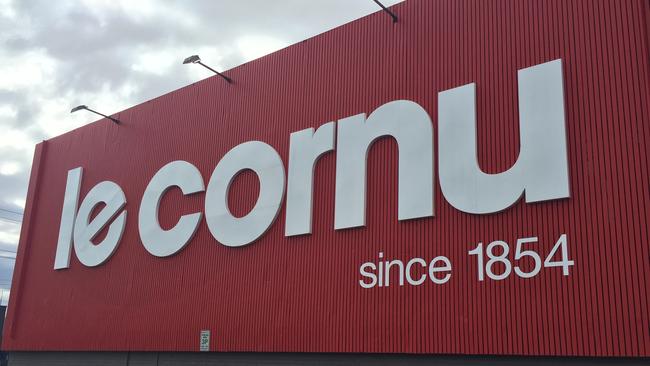
About 70 jobs were lost when the iconic furniture business closed its last remaining Adelaide store, on Anzac Highway in Keswick, in late 2016.
The store’s owner, Fantastic Holdings, said about 25 other employees would be redeployed and a second Le Cornu outlet in Darwin, would keep trading.
The original North Adelaide Le Cornu outlet closed in 1989 (but that’s a whole other story).
Fantastic bought the Le Cornu brand in 2008 for $1.3m but in 2011 announced a review into the business, which was underperforming.
Fantastic retail CEO Debra Singh said the store had been profitable in the intervening years, but in 2015-2016 business began to falter and the axe finally fell.

Ms Singh said the decision was strengthened by the fact the Keswick site, which the company had been leasing, had been put up for sale in 2015, and Le Cornu only had one more year on its lease to run.
She told reporters the mood inside the store was “sad” when she broke the news to staff – including one employee who had been at Le Cornu for 45 years.
“It’s a really tough day for Le Cornu,” Ms Singh said.
“The Le Cornu business has been an icon in the Adelaide retail market for many decades, largely due to the committed, dedicated, passionate people in the business.
“Like us, they will be proud of the mark that Le Cornu has made in South Australia.”

Le Cornu was founded by cabinet maker Phillip Le Cornu who emigrated to SA from the UK in 1854 and set up a furniture-making shop on the corner of O’Connell and Archer streets in North Adelaide in 1861.
As The Advertiser reported, Le Cornu became known for its catchy TV and newspaper advertising and the many display rooms, childcare facilities and restaurant at the Keswick store.
In 1986, customers lined up for hours outside both Adelaide outlets to grab bargains such as lounge suits for $10, mattresses for $1, carpets for 4c a metre and chests of drawers for 10c.
In 2010 the business announced a rebrand and plans to add new product lines, including TVs.
It unveiled its new-look stores in 2011.
But five years later, SA would be saying goodbye to a 155-year-old legacy.
HOLDEN

In October 2017, the very last Australian-made Holden finally rolled off the production line at GM’s Elizabeth factory, ending almost 60 years of continuous carmaking in Adelaide, and a remarkable century in the broader automotive industry in Australia.
GM announced its decision to stop making cars in Australia in 2013, putting close to 3000 workers out of a job in both SA and Victoria.
In a statement, GM Chairman and CEO Dan Akerson said the decision to wind up operations in Australia reflected “a perfect storm of negative influences the automotive industry faces in the country, including the sustained strength of the Australian dollar, high cost of production, small domestic market and arguably the most competitive and fragment auto market in the world”.
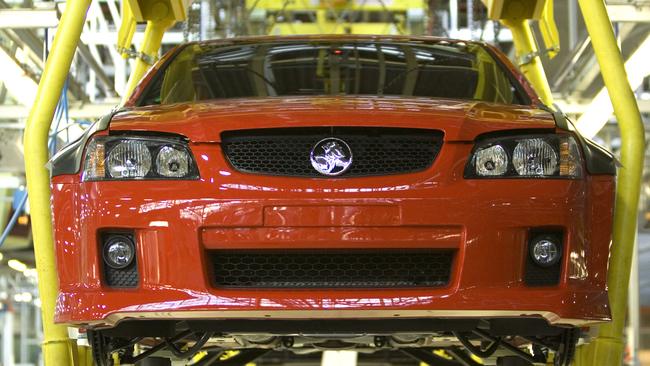
Acting Prime Minister Warren Truss said it was regrettable news.
“Holden has been an iconic national brand for Australians, a part of our heritage. It has meant a great deal to Australians over several generations. Many of us have had the pleasure of travelling and owning Australian built Holdens and it is a pity that will not continue into the future,” Mr Truss said.
GM’s decision kicked off a national conversation about our once-strong, but rapidly-disappearing manufacturing sector, and gave us four years to imagine an Australia that didn’t make Holdens.
More than just a car, Holden was a way of life for millions of Australians for at least 70 years; a job for generations of South Australians and, together with football, meat pies and kangaroos, a symbol of what it means to be quintessentially “Australian”.
It was a bitter pill to swallow.
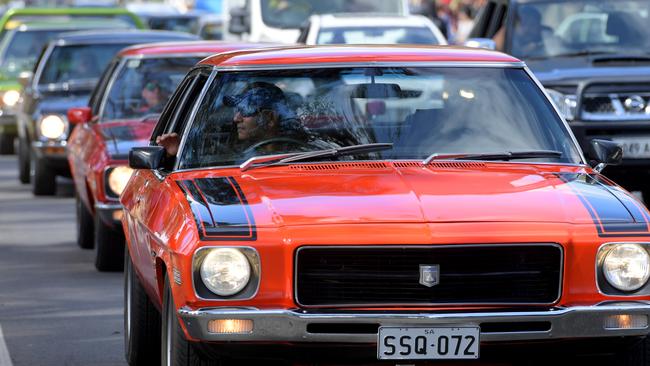
But as The Advertiser reported, there were no tears the day they closed the factory at Elizabeth. The mood was buoyant.
People brought their own Holdens and the crowd cheered for every Kingswood, Torana, Monaro, FJ and Holden that rolled by.
The tears were expected to flow later when the suburb’s own Jimmy Barnes belted out Working Class Man at the official staff goodbye at Adelaide Oval.
Because it was “a sad day”, the then-Premier Jay Weatherill acknowledged “but also a day when people can hold their head high”.
RADIO RENTALS
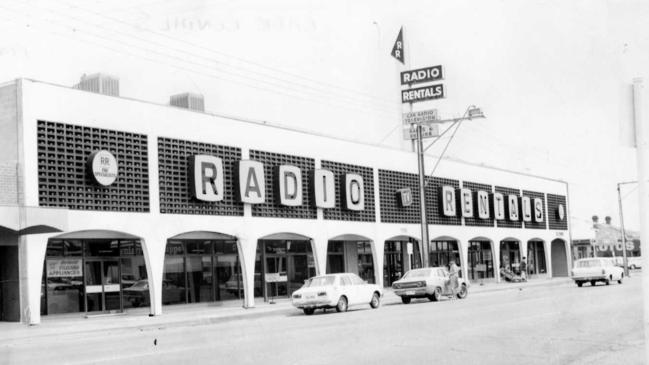
The family-owned retailer made the difficult decision to close in 2019, after more than 60 years in business amid “increasingly difficult trading conditions” and tough competition from online competitors.
The business employed about 100 people, with 12 stores and a head office, on Main North Road at Prospect.
As Cameron England reported, the retailer would be closing with no debts outstanding and a commitment to support employees and “help them find new jobs”.
Managing director Nick Palmer told The Advertiser, the business had explored every option to secure the future of the chain, including a sale or restructure but couldn’t find a way forward.
“After such a long time in business in South Australia, the decision to close our retail operations was very difficult and emotional.
“Our success, as a South Australian family owned business, was built around generations of wonderful employees, valued customers and business partners and a mission to make electrical and home appliances affordable and accessible to more and more homes and families,” Mr Palmer said.
“We look back with pride on our contribution … the jobs we created, the economic growth that we drove and the choice and services we provided to generations of South Australians.”
HILLS
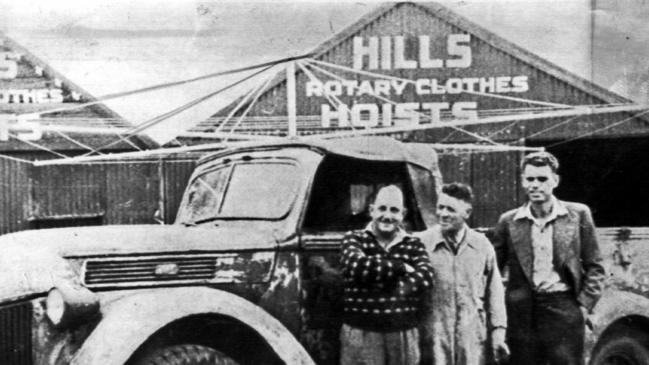
Made famous by its iconic Hills hoist clothesline, Hills Limited was a powerhouse in Australian manufacturing for almost 70 years.
The original company was founded in 1945 when Adelaide man Lance Hill designed and built a rotary hoist for his back yard after his wife complained their fruit trees had grown so big she couldn’t hang the washing on their single-wire clothesline.
Contrary to popular belief, Hill didn’t invent the concept that made him famous.
As the Australian Dictionary of Biography points out, versions of the idea date back as early as 1905 and Melbourne Gilbert Toyne patented several versions, including one in 1925 with a wind-up mechanism that became standard in the industry for years to come.
But the unlucky in life and in business Toyne missed his moment and Hill greatly improved on his competitors’ clunkier, less durable and more expensive versions.
Coupled with good marketing, “modest” prices and a lifetime guarantee, the Hills hoist was perfectly placed to take advantage of the post-war demand for household conveniences in an increasingly suburbanised Australia and became an instant hit, selling millions.
As The Australian reported, the company was pulling in revenues of more than $1bn in the 2000s and in 2006 the Hills hoist was declared a National Treasure by the National Library of Australia.
But in 2014, in the wake of declining profits, Hills Limited licenced the rights to make and sell 240 household items to Woolworths as part of a transformation of the company from assembly-line manufacturer to hi-tech electronics, communications devices and healthcare products.
In 2016, the Woolworths deal fell apart when the company decided to exit the home improvement business, which included Masters stores and Home Timber and Hardware.
In 2017, Hills Limited sold the Hills hoist and its garden and laundry lines to Ames Australasia, which continues to make and sell those products.
The company cut its last links to manufacturing in SA in 2019 when it announced the closure of its Foxtel dish and antenna business in O’Sullivan Beach.
In 2023, Hills was placed into administration a week after revealing it had lost a court case with a $5.48m payout attached, putting the company in a perilous situation, The Australian reported.
The Hills Hoist and Ames Australasia are not affected by the issues affecting the listed Hills entity, with the businesses not related in any way.
JAMESTOWN MEAT SERVICE
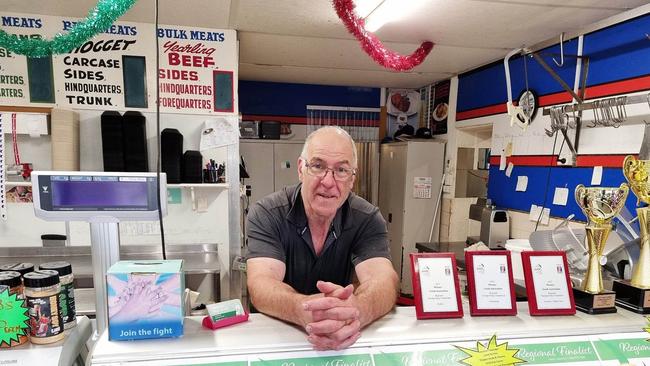
In business for an incredible 144 years, Jamestown Meat Service was the oldest continuous butcher shop in South Australia when it finally closed its doors in December 2022.
As The Advertiser reported, the shop announced the news on Facebook and said the decision came with “a heavy heart”.
“We had held off making this announcement in the hope of passing the reins on, however this has sadly not been the case,” the shop’s post read.
“While we are sad to see the longest continuous butcher shop come to an end, we close with many fond memories.”
Owner Denis Ganley, who ran the shop for 40 years, told ABC Radio Adelaide he had thoroughly enjoyed his time serving the community.
“It’s been a blast, it really has,” Mr Ganley said.
ALLAN’S
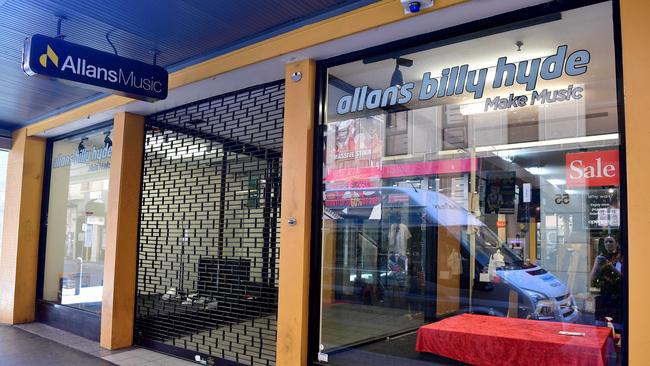
Founded in Melbourne in 1865, Allan’s opened its Adelaide store on Rundle St in the 1860s where it was based for about a century before moving to Gawler Place in the 1960s.
As The Advertiser wrote in 1986, the Melbourne store was “a mecca for the talented and famous” including Dame Nellie Melba, who took lessons there, and the Adelaide outlet also became “a landmark” for the state’s singers and musicians.
As manager Matt Campbell told The Advertiser at the time, the Adelaide store was the state’s oldest, the biggest and Australia’s largest stockist of sheet music.
“I believe the range we stock is greater than can be found in any store in Europe or America”.
Allan’s also stocked pianos, electronic keyboards, guitars, brass, woodwind and percussion instruments.

In 2010, the company merged with Billy Hyde Music to become Allan’s Billy Hyde but there was trouble around the corner.
In 2012, the business was placed into receivership with the lost of over 500 jobs and debts of more than $40m.
Several of the chain’s 25 outlets, including the Adelaide store, were eventually rescued by Con Gallin, the owner of Gallin’s music and Australian Musical Imports.
But in January 2018, the Adelaide store closed its doors abruptly with a spokesman from the head office citing “unforeseen circumstances”.
A few months later, the business went into voluntary administration and the music was over.
“It was Australia’s premier store for print music, keyboards, pianos, guitars and all sorts for many years,” former Adelaide employee Helen Blakebrough told The Advertiser.
“Allans was the place to go.”
JOHN REYNOLDS MUSIC CITY
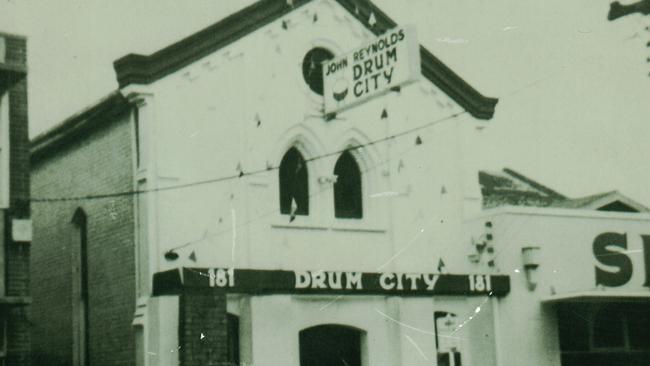
Established on Waymouth St in 1968, John Reynolds Music City was, as The Advertiser’s Paul Ashenden described it, more than just a shop.
“For nearly 50 years, it was a meeting place and spiritual home for SA musicians – especially drummers,” Ashenden wrote.
The store thrived during the peak of Adeaide’s live music scene in the 1980s and ‘90s and at one point, Ashenden reported, John Reynolds Music City was the biggest drum shop in the southern hemisphere.
Mr Reynolds was a talented drummer in his own right, playing with bands including The
Dominoes and Frank Sebastian Review and setting a world record for drumming non-stop for 82 hours. He was inducted into the SA Music Hall of Fame in 2015.
Drummers, Mr Reynolds said, were a “different breed of people” and for almost half a century they congregated at John Reynolds Music City to worship drums and drumming.
Fitting for a site that was once home to a church.
From 1978 to 2013, Mr Reynolds’ right-hand man, John Stephens, organised drum clinics that attracted some of the world’s biggest names in drumming.
Chad Smith from the Red Hot Chili Peppers, Chester Thompson from Genesis, Frank Zappa and The Mothers of Invention, Phil Collins and Santana, jazz fusion drummer Dave Weckl, Roy Burns from Benny Goodman’s band, The Merv Griffin Show and The Tonight Show.
The good times rolled on until 2017, when the business went into administration in the face of stiff competition from online sales and a live music scene in decline.
In late 2020 the building was demolished to make way for apartments, with work on the site still ongoing.
But before that happened about 60 former staff and customers gathered in Light Square to make the end of an era.
Mr Stephens said the razing of the shop would be a sad day.
“It was a meeting place for all of the drummers to come to – we weren’t interested in just selling them stuff,” he said.
“We had a lot of jokes and we were interested in what they were doing. If they brought a repair in, the repair would be done instantly, and at no charge. That’s just service, and it’s a service you don’t get anymore.”
WALLIS MAINLINE DRIVE-IN CINEMA
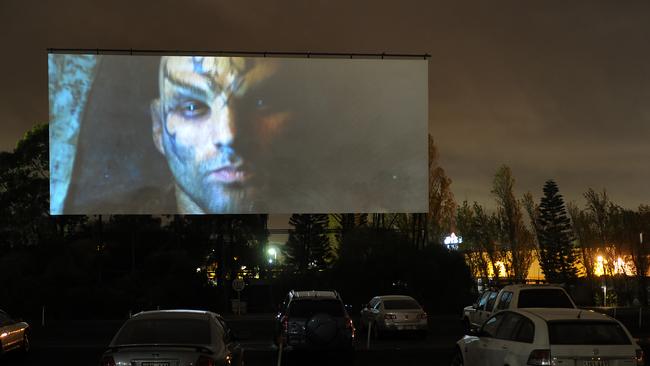
Debuting in 1955 with the Audrey Hepburn/Gregory Peck classic Roman holiday, the Mainline Drive-in at Gepps Cross was the last surviving drive-in cinema in Adelaide when it screened its last film in early 2022.
Owners Wallis Cinemas made the difficult decision to close in late 2021 in the wake of falling attendances and amid a film industry still reeling from the global pandemic.
The business also had to contend with illegal film downloads and the convenience of streaming services.
In its heyday, the drive-in could attract as many as 800 cars on a Saturday night – the perfect venue for courting couples or families looking for a fun night out.
But by the end, the drive-in was lucky to attract half that number and some nights, there were less than 100 cars in the sprawling outdoor movie house.
Wallis Branding Manager Deanna Wallis said the business had been weighing the drive-in’s future for a while and the decision to close wasn’t taken lightly.
“Being the last metropolitan drive-in, it wasn’t an easy decision at all,” Miss Wallis told the Advertiser.
“We’ve tried our best as a family to keep pushing through and fighting because it’s such a special piece of SA history.
“There’s been multiple issues over time, the main one being Covid and the impact that’s had on the broader film industry – that pushed it over the edge.”
The Wallis drive-in empire once comprised the Ocealine at West Beach, Parkline Mitchell Park, Valley Line St Agnes, Harbourline at Outer Harbor, Hi-Line Panorama and Hollywood Salisbury Downs as well as Mainline at Gepps Cross.
Out of Adelaide, there were drive-ins at Barmera, Loxton, Renmark and Tanunda. All closed.
In February 2022, South Australian movie buffs bundled into their cars and congregated at Gepps Cross for one last hurrah.
As Nathan Davies reported, perhaps fittingly, Ghostbusters: Afterlife was the final film to be shown.
Coober Pedy is now home to the very last drive-in in the state.
It is owned and run by volunteers.
Wallis continues to run several cinemas; at Mt Barker, Mitcham, North Adelaide and Noarlunga in SA and Mildura in Victoria.
WEST END
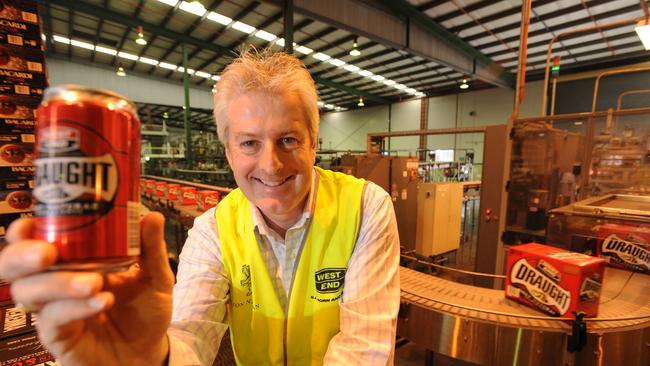
It was almost as old as the state itself.
But West End’s 160 year run SA finally came to an end in 2021 after owner Lion Australia announced it would be pulling the pin on its iconic Thebarton brewery.
As Cameron England reported, more than 94 workers at the site were set to lose their jobs in the shutdown, with 40 employees to be offered jobs in sales and sponsorships.
The beers made at the site – West End and Southwark – would be brewed in the eastern states and shipped back to SA for sale.
Announcing plans to wind up operations in 2020, Lion Australia managing director James Brindley said the company had explored all options to save the factory.

But for a laundry list of reasons; declining beer sales, changing tastes and rising costs, the brewery was simply no longer viable.
The brewery was operating at only 50 per cent capacity, Mr Brindley said.
“It’s a sad day for our industry, it’s a sad day for West End, it’s a sad day for South Australia,’’ he said.
“Over the last few decades, consumer preferences have changed. The beer market in Australia continues to decline. It’s now at its lowest per capita consumption ever recorded.
“At the same time, there are about 700 new craft brewers, so the competition is intense.’’
The last kegs rolled off the production line in June 2021 and much of the brewing equipment at the factory was progressively sold off.
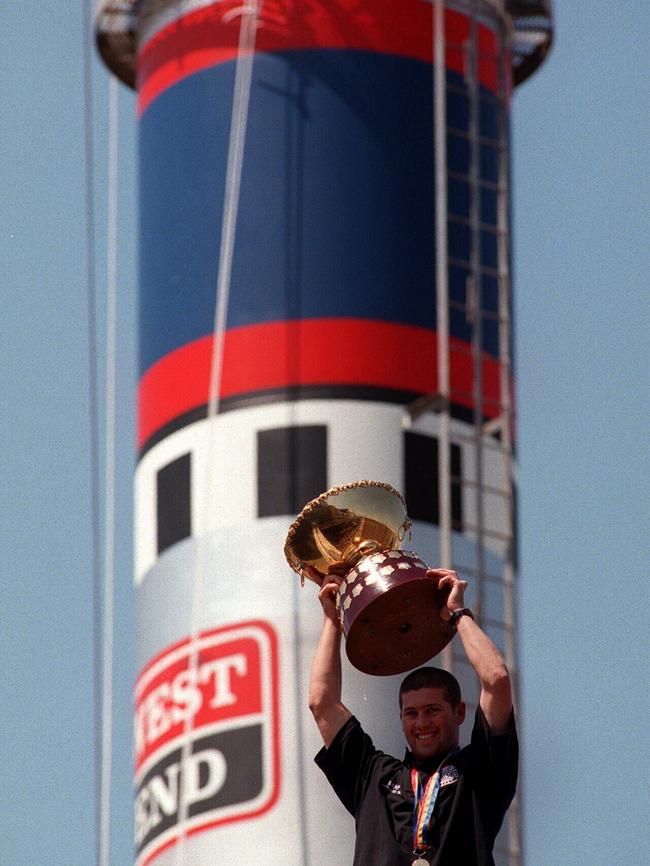

A huge brewhouse was sold to a craft distillery in Robinvale where it will be used to make malt whiskey, while bottle, can and keg production lines and beer and cider filtration equipment were sold to buyers as far away as Canada.
The site has since been razed with Lion leading a push for 7.7ha of land to be rezoned to allow a mix of medium to high density housing, shops, restaurants and commercial development.
In August 2022, an archaeological dig uncovered the ruins of Colonel William Light’s cottage, the cottage well, dairy and garden.

Brewing began at the Port Rd site in 1886, first as Torrenside Brewery, then Southwark and then, from 1980, West End after West End relocated from Hindley St where it had been in operation since 1859.
West End became famous for the annual unveiling of the team colours of the winner of the SANFL Grand Final – a tradition dating back to 1954 – and its annual Riverbank Christmas display, which was taken over by West Torrens Council after the brewery’s closure.
Read the full West End history here.
CAROMA
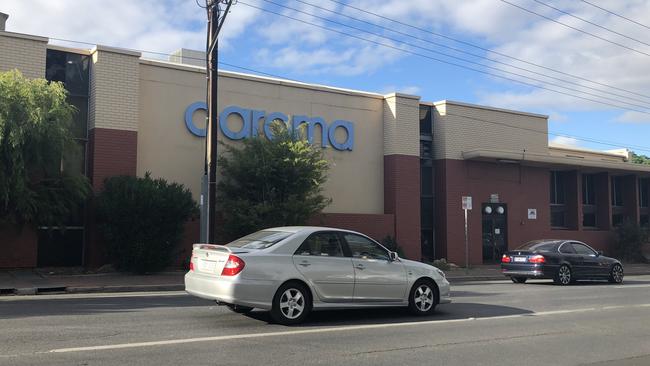
The pioneering toilet-maker closed in 2017 after 76 years of manufacturing in South Australia.
Founded first as a plastics company by Austrian immigrant Charles Rothauser and his wife Roma, the company set up shop in Norwood in 1941.
Innovative from the get-go, the company was responsible for several world firsts, including the first disposable plastic hypodermic syringe.
As the Powerhouse Museum noted, Rothsauser developed the product to help in the delivery of penicillin, which tended to gum up in the glass needles of the time, making them hard to clean.
In 1956 the company changed its name to Caroma and moved into bathroom products, inventing and beginning the manufacture of the world’s first single-piece plastic cistern.
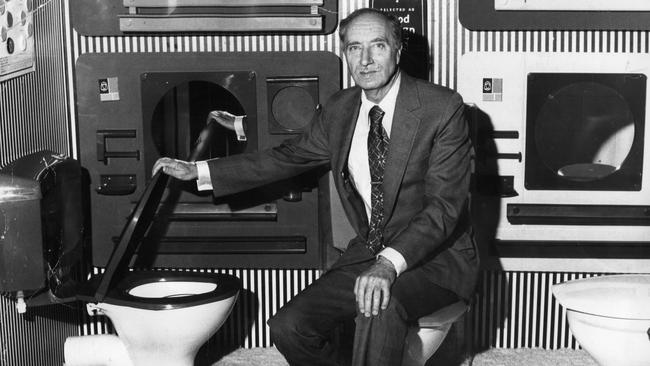
Arguably Caroma’s most important innovation came in 1980 when the company’s design team, led by Bruce Thompson, developed the world’s first dual-flush toilet.
According to the State Library of SA’s SA Memory website, the first dual-flush toilet was a water-saving wonder, using 11L for a full flush and 5.5L for a half flush, saving households about 32,000L
In 1993, an upgraded version of the toilet reduced that to 6L for a full flush and 3L for a half flush. The invention was so revolutionary, soon after it hit the market, all Australian states, except NSW, introduced legislation making dual-flush toilets compulsory in all new buildings.
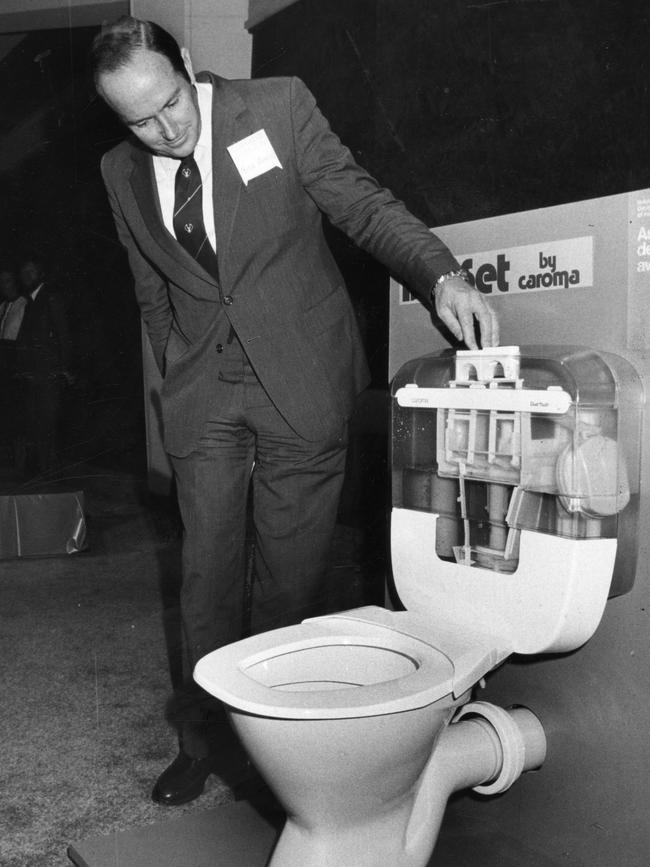
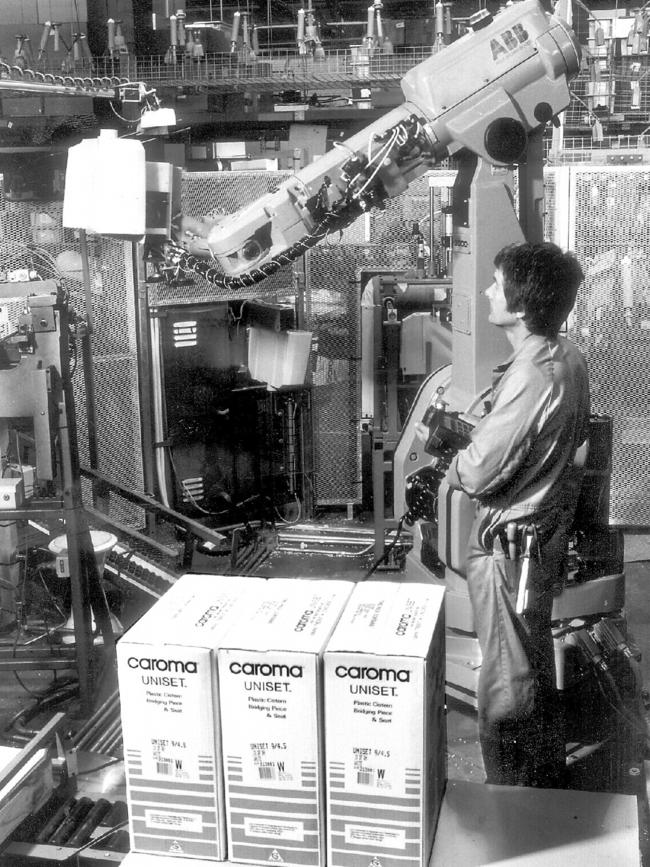
In 2014, Caroma’s owner – fittings and fixtures supplier GWA Group – announced it would phase out manufacturing in Norwood and the factory finally closed in 2017.
Aknowleding the contribution of the company’s Adelaide staff, past and present, GWA’s then-Managing Director Tim Salt said the Norwood workers had helped make Caroma Australia’s most “recognisable and trusted brands”.
“Norwood’s world-leading plastics innovation and flushing technologies are renowned around the world. As such Norwood has been for many years the lifeblood of the business and has helped to put Caroma on the map,” he said.
The company outsourced the manufacturing of its products to Malaysia, China and Europe.



